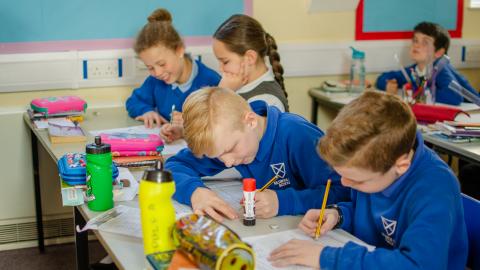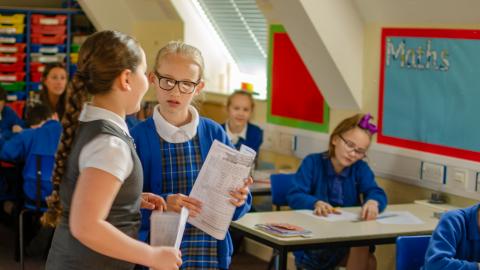Intent
Our Maths curriculum is ambitious, thorough and progressive. We have agreed essential knowledge and skills that our pupils need to know by the end of each year which come from the 2014 National Curriculum for Maths.
We aim for all children to:
- Become fluent in the fundamentals of Mathematics
- Have the ability to reason mathematically
- Solve problems by applying their Mathematics
At Kildwick CE Primary, these skills are embedded within Maths lessons and developed consistently over time for all pupils. We are committed to making sure that children recognise the importance of Maths both across the curriculum but also in the wider world and that they are also able to use their mathematical skills and knowledge confidently in their lives in a range of different contexts.
We want all children to enjoy Mathematics and to experience success in the subject, with the ability to reason mathematically once fluency skills have been secured. We are committed to developing children’s curiosity and love of the subject to create enthusiastic, life-long mathematicians.
Implementation
At Kildwick Primary, children take part in Mathematics activities on a daily basis in order cover a broad and balanced mathematical curriculum. All children have access to Times Tables Rock Stars to build on their multiplication skills. Key Stage Two work on these skills both in school and at home.
We aim for each child to be confident in each yearly objective and develop their ability to use this knowledge to develop a greater depth of understanding to complete varied fluency tasks as well as problem solving and reasoning questions. We use a range of textbooks and online resources throughout the school to ensure a curriculum that is specific to each child’s learning needs.
The following principles and features outline our approach to Mathematics and convey how our curriculum is implemented:
- Teachers reinforce an expectation that all children are capable of achieving high standards in Mathematics.
- The large majority of children progress through the curriculum content at the same pace. Differentiation is achieved by emphasising deep knowledge and through individual support and intervention. Intervention may come in the form of pre-teaching, targeted support or timely consolidation sessions.
- Teaching is underpinned by methodical curriculum design and supported by carefully crafted lessons and resources to foster deep conceptual and procedural knowledge. Teachers use assessment to inform future lessons.
- Practice and consolidation play a central role. Children have the opportunity to practise their skills and improve their understanding.
- Teachers use precise questioning in class to test conceptual and procedural knowledge and assess children regularly to identify those requiring intervention, so that all children achieve.
- Teachers provide the opportunity for children to revisit their previous learning, including basic arithmetic skills. This is clearly shown in Maths books by using a red pen or pencil. Children are able to use their previous learning and skills unconsciously and with ease through frequent reminders and recall opportunities.
- Before a new unit of work, teachers remind children of the skills needed for the upcoming work. This becomes more evident when children are completing space, shape and measure topics.
To ensure whole school consistency and progression, we use the White Rose Maths Hub scheme which supports our both our mixed year group and single year group classes.
Mathematical topics are taught in blocks, to enable the achievement of mastery over time. Within each unit children can strive to achieve understanding at a greater depth, with children being offered rich and sophisticated problems, as well as exploratory, investigative tasks, when appropriate for the individual. We recognise that in order for pupils to progress to deeper and more complex problems, children need to be confident and fluent across each yearly objective.
New concepts are introduced to children in a visual and guided example. Class discussion and targeted questioning builds the fluency levels within the class before independent practise takes place.
Problem-solving activities prompt discussion and reasoning, as well as promoting an awareness of maths in relatable real-life contexts that link to other areas of learning. Children apply their fluency skills and increase their confidence before progressing to more complex problems.
In Key Stage One, these problems are often presented with objects (concrete manipulatives) for children to use. Children may also use manipulatives in KS2 to support learning. Teachers also equip pupils with the skills to solve problems without physical objects and encourage diagrams and sketches to help find answers.
Impact
We want children to be confident in making rich connections across mathematical ideas as a result of developing fluency, mathematical reasoning and competence in solving increasingly sophisticated, contextual problems whilst developing a life-long love of Maths.
Through high quality teaching, guidance and effective feedback, we aspire for children to achieve age-related expectations or above by the end of each year group. Children will be prepared for the next step in their mathematical education.
In every lesson, teachers formatively assess children’s understanding through verbal feedback and marking in books. Teachers assess whether the child has met the objective and acts on this to create the next step in the unit.
At the end of each term, children in Year One and above complete the White Rose Maths Hub termly assessments. Year Two and Year Six pupils also complete a range of past papers throughout the year in order to expose children to the format of the end of key stage statutory assessments. Children in EYFS are assessed through adult-led activities and observations.
The results from both the formative assessment and summative assessment are then used to determine children’s progress and attainment.
Our expectation is that the majority of pupils will move through the programmes of study at broadly the same pace. However, decisions about when to progress should always be based on the security of pupils’ understanding and their readiness to move to the next stage. Pupils who grasp concepts rapidly should be challenged through being offered rich and sophisticated problems before any acceleration through new content. Some children need more time to practise and improve their fluency skills before using their mathematical knowledge to solve problems.
The teaching of maths is monitored throughout the year by the Maths coordinator through book scrutinies, lesson observations and conversations with staff and pupils.
Please see the PDFs below for the maths objectives for each individual year group.


